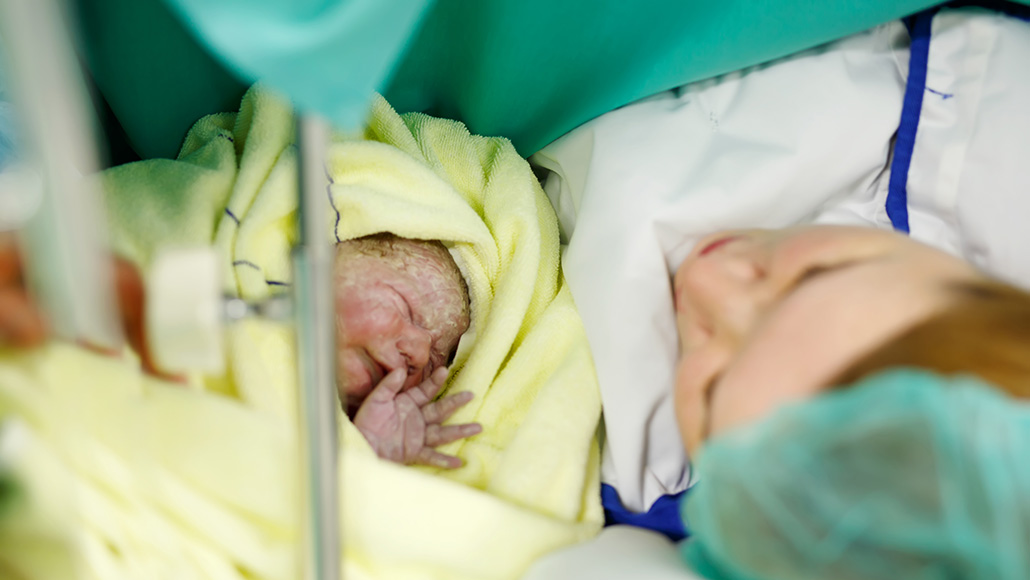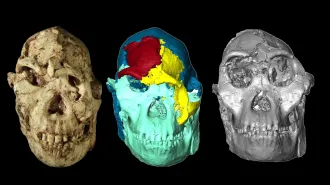
Birth details, including whether antibiotics were used, were linked to differences in babies’ gut microbes. Scientists don’t yet know whether these differences affect health later in life.
romrodinka/iStock/Getty Images Plus
Babies born by cesarean section may miss out on many of mom’s helpful gut microbes. Instead, these infants’ guts harbor more bacteria that commonly lurk in hospital rooms, scientists found.
The finding, described September 18 in Nature, adds weight to the idea that C-sections, and the antibiotics that often come with the procedure, may change the type of bacteria that first take up residence in a newborn’s gut. This collection of microbes helps form the microbiome, and details of this early colonization might be important for long-term health, some scientists suspect.
Still, the results shouldn’t dissuade women from receiving C-sections if needed. “Cesarean sections are a life-saving and medically necessary intervention,” says Lisa Stinson, a molecular microbiologist and reproductive biologist of the University of Western Australia in Perth. But “we need a better understanding of their long-term effects on infants.”
Microbiome imbalances have been linked to disorders such as asthma, allergies and other inflammatory diseases (SN: 2/17/17). But scientists don’t know whether a baby’s nascent microbiome could ultimately influence these disorders. Nor is it clear whether birth details change that early microbial colonization.
To get a snapshot of these early bacterial moments, genomicist Yan Shao of the Wellcome Sanger Institute in Cambridge, England, and colleagues studied the gut bacteria living in 596 full-term, healthy babies born in U.K. hospitals. In the 314 babies born vaginally, helpful gut microbes such as Bifidobacterium and Bacteroides made up 68 percent on average of the total gut bacteria. These bacteria were scarcer in the guts of babies born by C-section. Instead, species commonly found in hospital settings, including potentially harmful Enterococcus and Clostridium, accounted for an average of 68 percent of the total gut bacteria.
Surprisingly, neither group of babies had much bacteria from their mothers’ vaginas, an absence that calls into question the usefulness of delivering vaginal microbes to newborns (SN: 3/30/16). Smearing vaginal fluids onto babies born via C-section has been studied as a way to restore normal gut microbiota. But the new study “found no evidence to support controversial ‘vaginal swabbing’ practices,” Shao says.
Along with the birth mode itself, antibiotics delivered during birth also shape which bacteria set up shop in an infant’s gut, the study suggests. In many places, mothers who undergo C-sections receive antibiotics to prevent infections. Along with removing potential threats, these drugs can kill helpful bacteria. In the study, babies born vaginally but whose mothers also took antibiotics had fewer helpful Bacteroides bacteria. That suggests that some of the bacterial differences are “related to maternal antibiotic exposure — not lack of exposure to vaginal bacteria at birth,” Stinson says.
Antibiotics could also affect the microbial mixtures in mothers’ breast milk, Stinson says, which could then influence babies’ gut microbiomes. In the study, breastfeeding had a small effect on babies’ gut bacteria.
As the babies grew older and began eating solid food, differences in gut bacteria composition shrank, researchers found by looking at a smaller set of the babies.
During the study, all of the babies were healthy. It’s not known whether the bacteria that have the potential to cause infections in these babies would actually cause trouble later in life. Even so, starting out life with the wrong repertoire of microbes likely has consequences, says microbiologist Maria Dominguez-Bello of Rutgers University in New Brunswick, N.J.







